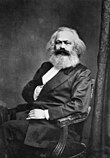
Back النظرية الماركسية للطبقات Arabic Teoría de las clases sociales marxista Spanish Teori kelas Marxisme ID Марксистская классовая теория Russian Lý thuyết giai cấp của Marx Vietnamese
This article includes a list of general references, but it lacks sufficient corresponding inline citations. (September 2017) |
| Part of a series on |
| Marxian economics |
|---|
 |
Marxian class theory asserts that an individual's position within a class hierarchy is determined by their role in the production process, and argues that political and ideological consciousness is determined by class position.[1] A class is those who share common economic interests, are conscious of those interests, and engage in collective action which advances those interests.[2] Within Marxian class theory, the structure of the production process forms the basis of class construction.
To Marx, a class is a group with intrinsic tendencies and interests that differ from those of other groups within society, the basis of a fundamental antagonism between such groups.[citation needed] For example, it is in the laborer's best interest to maximize wages and benefits and in the capitalist's best interest to maximize profit at the expense of such, leading to a contradiction within the capitalist system, even if the laborers and capitalists themselves are unaware of the clash of interests.
Marxian class theory has been open to a range of alternate positions, most notably from scholars such as E. P. Thompson and Mario Tronti. Both Thompson and Tronti suggest class consciousness within the production process precedes the formation of productive relationships. In this sense, Marxian class theory often relates to discussion over pre-existing class struggles.
- ^ Parkin, F. (1979). Marx's Theory of History: A Bourgeois Critique. New York: Columbia University Press. ISBN 978-0231048811.
- ^ Andrew, Edward (September 1983). "Class in Itself and Class against Capital: Karl Marx and His Classifiers". Canadian Journal of Political Science / Revue canadienne de science politique. 16 (3). Canadian Political Science Association: 577–584. doi:10.1017/S0008423900023994. JSTOR 3227396. S2CID 145504985.
© MMXXIII Rich X Search. We shall prevail. All rights reserved. Rich X Search